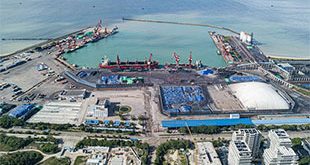
FDI expected to be reached by April 2020
ANALYSIS | LIAM TAYLOR – Africa Business Magazine | Oil deposits have sat beneath the shores of Lake Albert, in western Uganda, for millions of years. Since its discovery in 2006, plans to extract the oil, estimated at over 1bn recoverable barrels, have repeatedly stumbled over disagreements between the government and oil companies. The latest was a tax dispute that threw the whole project into limbo, holding up the commencement of commercial production. `
The argument turned on the transfer of assets between the three oil companies who are developing the fields: Total, a French supermajor, CNOOC, a Chinese state firm, and Tullow, an independent with headquarters in London. In 2017, Tullow announced it would sell on most of its interests in the Uganda project to its two larger partners, reducing its own stake to 11.76%.
In August this year, the companies and the government could still not agree how the $900m deal should be taxed. A sales agreement between the companies expired. The deal was off.
Uncertainty over the transaction has delayed a long-awaited final investment decision (FID) on the oil project, which was expected this year.
Irene Muloni, the former immediate energy minister, had told the African Business Magazine that a decision will be reached by April 2020. It typically takes three years for oil projects to move from FID to first oil.
Meanwhile Total has suspended activity on the 1,445km pipeline that will carry Ugandan oil to the sea. Back in February its boss, Patrick Pouyanné, had quipped about the oil project’s numerous challenges. “There are many crocodiles in Lake Albert,” he said. “We need to domesticate the crocodiles before we move forward.” The story of Uganda’s oil suggests that those “crocodiles” will be hard to tame.
Tax disputes
Uganda has already been waiting a century for oil. The first formal survey around Lake Albert was conducted by a British team in 1925. President Yoweri Museveni held meetings about oil with advisers two weeks after seizing power in 1986, and soon afterwards called off talks with oil companies while the country built its negotiating capacity.
At the time, most African oil exploration was off the Atlantic coast. When commercial quantities were finally discovered in three fields in the western part of the country in 2006 it was the largest onshore discovery in Africa for two decades.
“There is a lot of nonsense that oil will be a curse. No way,” said Museveni when he announced the find. Sensibly, the government did not rush to the market.
It took time to pass relevant laws and recruit a team of competent technocrats. Museveni, a notorious micromanager, took a deep personal interest in negotiations with oil companies. He drove a hard bargain.
The most contentious issue was tax. In 2010 Heritage, the company that had done much of the initial exploration work, agreed to sell on its assets to Tullow. The government imposed a $434m capital gains tax bill, which Heritage disputed. A local court and an arbitration case in London both ruled in favour of the government, and Museveni later awarded a Shs6bn ($1.6m) bonus to 42 officials who had helped in the case. A similar dispute arose when – in a foreshadowing of the current standoff – Tullow sold on part of its stake to Total and CNOOC. That matter was settled out of court in 2015.
Other tensions bubbled below the surface. Museveni wanted to refine oil locally. The oil companies wanted to export it, arguing that a small, inland refinery was economically unviable. In the end they agreed that up to 60,000 barrels per day – about a quarter of the total – would be refined in Uganda. The rest will be transported to the Tanzanian coast through the longest heated pipeline in the world.
 The Independent Uganda: You get the Truth we Pay the Price
The Independent Uganda: You get the Truth we Pay the Price






THIS is what I posted in response to an article by ANDREW MWENDA on the 16th September, 2019 (is this supposed to be the birthday of M7) and even before the ink has dried, what I predicted then, unsurprisingly
has come to pass.
September 17, 2019 at 11:27 am
“The multinational companies need the oil more than you may think; even if they go, others will surely come in. Use the time for better planning and capacity development of our fellow nationals in oil and gas.”
IT may be that, but hope you know that these oil companies act as a cartel, or call it a cabal, sometimes bordering on the criminal, and many times they act as one even if they appear as different entities and they do know how to share their spoils.
They have more time, and many times more resources than our poor countries, and most times know the greed of our rulers and as you have seen, when Tullow took action, Total took almost similar action.
Ultimately it will be our hapless rulers who will go back on their knees and tail between legs ( out of view/ sight of all of us of course), and then this time the stakes are even higher.
Or else we shall end up running to the Chinese who will also extract their own pound of flesh.
Right from the word go, most times the odds are stacked against us, and all this will have started with our own incompetence and greed.
And another post.
ejakait engoraton
September 17, 2019 at 6:55 pm
THIS whole thing boils down to just one person, and you know who it is.
EVEN a fool would know that the law regarding Capital Gains Tax is wrong, UGANDA is not a unique country to the extent that its laws differ significantly from those of other nations, in fact most of our laws are “cut and paste”in that they follow the template of laws from other nations, most notably for us , British/English law.And most laws are a matter of “common sense” which for once, rightly M9 said is not common.
But then again , we may be dealing with the “law of cattle keepers”, whereby if I give you a calf and you keep it til it grows, you give back my fully grown cow/bull, regardless of the effort I have put in to raise your calf. It is the basis of “empano”.
We all know that if they wanted the oil to come out of the ground tomorrow, it would laws or no laws. I have a feeling that it is not coming out is a result of one person who has never kept his side of the bargain all his life. HE may have taken a cut from the present oil companies and probably wants more over and above what was initially agreed, seeing as it is that these companies are making a “killing” by farming down their interest, and in so doing bringing on board a new party, or else he wants to frustrate these companies and then whatever new entities come in, the slate is wiped clean and they can start all over again.
IN this case if it was a person involved in the deal, then that person would be made to meet their maker so that as they say “dead men tell no tales”.